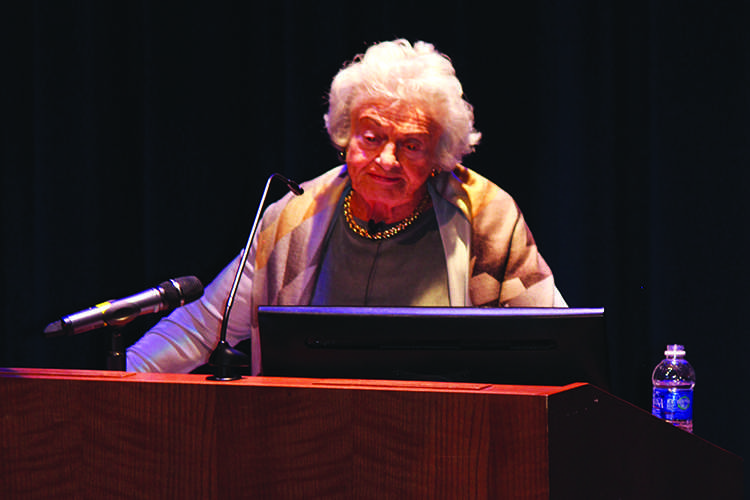Story of a survivor
Love and friendship are essential parts of the human existence. They often help people get through the darkest of times and the most difficult of experiences.
These pieces of humanity helped Gerda Weissmann Klein survive the Holocaust and live to tell her story. On Oct. 1, Klein spoke at the first Forum event of the semester in the Schofield Auditorium at UW-Eau Claire.
Klein said the companionship of a childhood friend and the memories of a loving family helped her through the concentration camps of the Holocaust.
Klein was 15 years old on September 3, 1939 when the Nazis invaded her home in Poland. After being separated from her parents, she was sent to labor camps where she spent six years suffering. Klein also participated in the death march in which 2,000 women were ordered by the Nazis to walk 350 miles to avoid the advances of the Allied Forces.
Through the pain of the death march and life in the concentration camps, Klein kept moving forward with a pair of skiing shoes she got from her father and the kindness of a friend named Ilsa.
According to Teresa Sanislo, a history professor who teaches a Nazis and Germany class, Klein’s story, and others like it, help to give a better understanding of this time in history.
“It really does humanize the story,” Sanislo said. “Sometimes people have watched the History Channel, they’ve seen movies, they’ve heard numbers or statistics and it’s very depersonalized. But when you have a person speak from their own experience, it really makes it real to people.”
In 1945, Klein was given a new sense of hope and freedom when she was liberated by U.S. Army soldiers. One of these soldiers became her husband who she said gave her back a sense of humanity after simply opening the door for her.
With her husband’s help, Klein became dedicated to advocating Holocaust education. In 2008, she started the organization, Citizenship Counts. Klein said in her speech that this organization’s purpose is to inform young people of the greatness of what it is like to be an American citizen. As the organization’s website states, it is committed to educating today’s middle and high school students to have pride in their American citizenship and to participate in community service.
The subject of freedom and appreciation for the blessings one has as a citizen of the United States is vitally important to Klein. She said she has a strong hope in today’s generation of American students.
“You are the messengers to a future I shall not see. In your hands rests the greatest honor that has been given to us, to be free,” Klein said in her speech.
In reflecting on Klein’s speech, senior public history major Robin Kintner said her story gives a unique perspective on how the life a person has as a citizen in America should not be taken for granted.
“It makes you realize that you should probably appreciate more the life you have,” Kintner said. “I’ve never seen anyone that appreciative and optimistic.”
Emily Johnson, a freshman in Sanislo’s class, said she left the event positively affected.
“Putting this together with the class, it makes it more real to me,” Johnson said.
Johnson also said the themes of selflessness in friendship and genuine love were the themes that impacted her the most.











